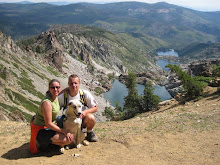1) Afghan National Security Forces Program - deals with the Afghan National Police, Border Police, and National Army
2) Counter-Narcotics/Border Management Initiative - provides security along the borders through construction of guard towers and forward operating bases
3) Strategic Reconstruction Program - works with other international agencies to develop water and electrical resources and construct roads, and
4) U.S./Coalition Forces Power Projection Program - constructs the military facilities required to maintain troop and civilian workforce in Afghanistan
Based on the programs listed above it gives the initial impression that less humanitarian type projects (water supply, sewer systems and treatment plants, school, hospitals, etc.) are being constructed and completed in Afghanistan then in Iraq. Since Dani worked on sewer and water systems when she was in Iraq, the "non-humanitarian type work" has been a large concern of hers - that the work wouldn't seem to be as rewarding. It's much to early in our tour to determine whether or not the work is rewarding. But about a month before we deployed a Colonel put the work we are doing into perspective. He said that security is required in Afghanistan prior to building water systems, sewer lines, schools, and hospitals, that there needs to be strong sense of order/law, and that other international organizations are focusing on the "humanitarian" mission. This allows us to focus on the security that will permit all other efforts to be successful.
Another interesting point this Colonel made was there isn’t the experience and education in Afghanistan to staff the schools and hospitals even if we where building them. Beginning with the Soviet invasion some 30 years ago and continuing with the repression of the Taliban, very few doctors and teachers remain in Afghanistan. Efforts are now underway to open schools to teach the teachers who w
 ill eventually fill the schools that will built.
ill eventually fill the schools that will built.Photo: National Military Afghanistan Academy Graduation (USACE mentors in brown)
Along those lines, Dani attended the graduation of three Afghanistan Lieutenants who studied and were mentored by USACE. The idea is they can now go and teach their peers in the Afghan Army what they learned – engineering, project management, construction, etc.
USACE is also attempting to place an emphasis on employing local nationals (Afghans) to learn as much about USACE so that when the U.S. leaves there will be locals left to continue and maintain all that we have started. To date this has seen minimal success due to a variety of reason, but primarily the lack of access to the computer networks.
Enough politics…So, Billy works as a cost engineer. The government needs to budget for everything that gets built…what, the government cares about a budget?! No way! Believe it or not, Congress wants to know how much the construction work USACE plans to oversee will cost. Thus, Billy develops what are called budgetary estimates to give Congress visibility on the total costs of a project. In addition to budgetary estimates, Billy also develops detailed estimates for construction projects before a contract is awarded to a contractor. The detailed estimates allow USACE to determine if the government is getting a fair and reasonable price. And last, but not least, Billy develops estimates if there is a large change in the construction contract that requires additional money (or savings). He’s been working on figuring out costs for everything from renting armored cars to building FOBs (Forward Operating Bases) in the middle of nowhere.
Dani is a Project Manager in the Afghan National Police (ANP) Program. She is currently managing 21 contracts with over 60 constructions sites for Uniform Police District ( 60-120 people) and Provincial (400 people) Headquarters, Afghan National Civil Order Police (345 people) Battalions and Border Police Company (90 people) Headquarters. Basically these are self contained compounds (diesel generators for power, wells for water and septic systems for sewage) with barracks for personnel. The contracts are "site adapt" which means the building is a cookie cutter design (which is fondly referred to as the "cube") and the contractor only needs to design the foundation, in ground utilities, etc.

Photo: Mountains of Afghanistan
There are several challenges with these projects. For this update, the highlight will be about the challenges of LAND. Afghanistan is very mountainous and most usable land is already built on, in addition to the fact that it's one of the most heavily mined countries in the world! So, before a project begins, a right of entry is provided by the Afghanistan Ministry of Interior (MOI). This is basically the permission slip for USACE to build on the piece of land that is owned by the Government. Note that this means no one in the village or town claims to own the land. Once the project is awarded, the first step a contractor has to complete is to demine the site. This means removing all the unexploded ordinances (rockets, mines, grenades, etc.) down to 1 meter below the ground surface. After this is done, it’s amazing how many people in the village say they own the land - the land is now usable and safe so of course it doesn't belong to the Afghanistan Government. So, at the beginning of a majority of the contracts, this is the first hurdle!

No comments:
Post a Comment
Note: Only a member of this blog may post a comment.